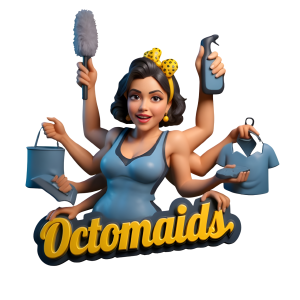Pregnancy brings joy, but also questions about daily activities. At Octomaids, we often hear expectant mothers ask, “Can I do house cleaning while pregnant?”
It’s a valid concern, as maintaining a clean home is important, but so is the health of both mother and baby. This blog post will explore safe cleaning practices during pregnancy and offer alternatives for those who prefer to avoid the task altogether.
What Are the Risks of Cleaning While Pregnant?
Cleaning during pregnancy requires a balance between maintaining hygiene and protecting health. This chapter explores the potential hazards expectant mothers face when cleaning and provides practical safety measures.
Chemical Exposure Concerns
The primary concern for pregnant women is exposure to harmful chemicals. A study published in the International Journal of Public Health revealed that the use of spray cleaning products during pregnancy increased the risk of lower respiratory tract infections in infants by 29%. This statistic underscores the need for caution.
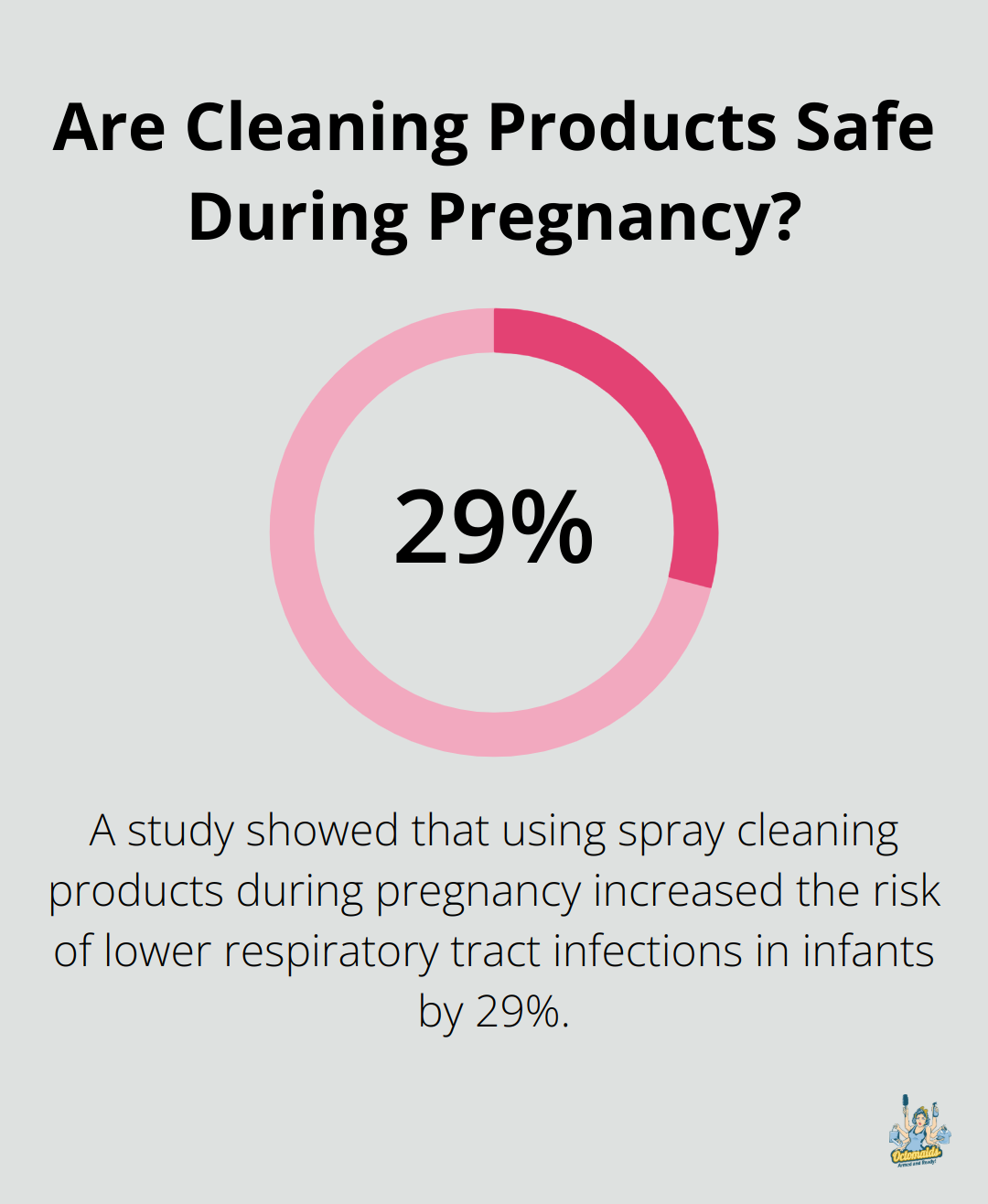
Many household cleaners contain volatile organic compounds (VOCs), phthalates, and other potentially harmful substances. These chemicals can enter the body through skin absorption or inhalation, potentially affecting fetal development. The Environmental Working Group (EWG) suggests choosing cleaners rated ‘A’ or ‘B’ on their safety scale to reduce risks.
Physical Challenges and Ergonomic Issues
Pregnancy transforms a woman’s body, affecting balance and flexibility. The American Pregnancy Association stresses the importance of proper posture and body mechanics while cleaning. As pregnancy progresses, the growing belly shifts the center of gravity, which complicates bending, reaching, and lifting tasks.
Physical strain from cleaning tasks during pregnancy can increase the risk of injury. Activities such as heavy lifting and frequent bending should be avoided. It’s important to take frequent breaks to prevent fatigue and muscle strain.
Slip and Fall Hazards
The risk of slips and falls increases significantly during pregnancy. The March of Dimes warns that falls are a common cause of injury among pregnant women. Wet floors from mopping, reaching for high shelves, or using step stools can all create dangerous situations.
To reduce these risks, use non-slip mats, avoid climbing on furniture or ladders, and keep floors dry and clutter-free. If cleaning is necessary, focus on tasks that don’t require stretching or balancing.
Practical Safety Measures
When cleaning is unavoidable, take these precautions:
- Use natural cleaning alternatives (like vinegar and baking soda)
- Ensure proper ventilation by opening windows
- Wear protective gloves and a mask
- Avoid mixing cleaning products, which can create toxic fumes
While maintaining a clean home is important, the health of both mother and baby should always take precedence. For those concerned about the risks, delegating cleaning tasks or hiring a professional service can ensure a safe and clean environment during pregnancy.
As we move forward, let’s explore safe cleaning practices that expectant mothers can adopt to minimize these risks while maintaining a clean home.
How Can Pregnant Women Clean Safely?
Embrace Natural Cleaning Solutions
Pregnant women should switch to natural cleaning products to maintain a clean home without compromising their health. Baking soda is an effective cleaning agent that also deodorizes. However, pregnant women should check before using any cleaning product, even natural ones. A mixture of equal parts water and white vinegar can clean most surfaces (including windows and countertops). Baking soda works well for scrubbing sinks and tubs without the risks associated with commercial scouring powders.
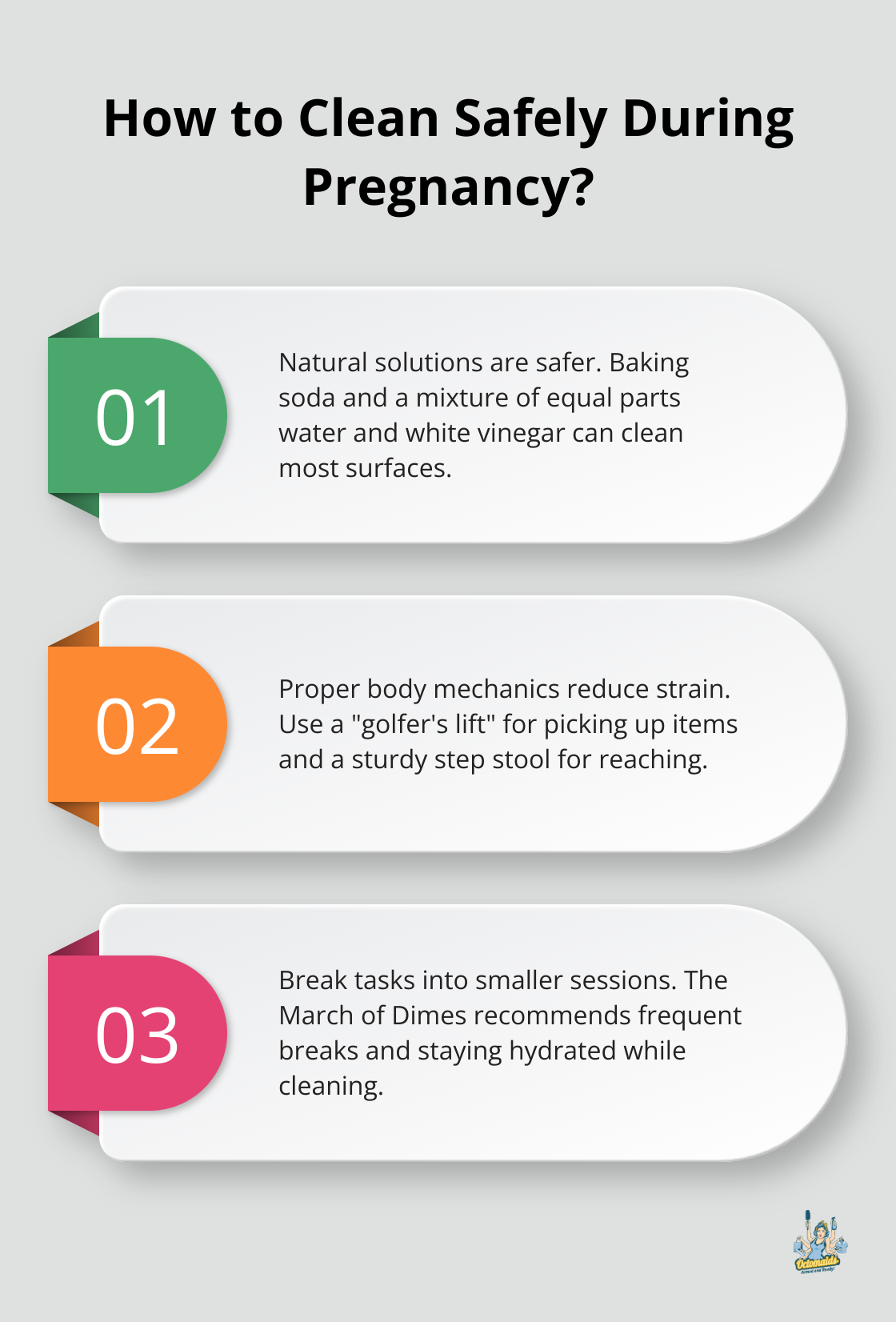
The Environmental Working Group (EWG) provides a guide to safer cleaning products backed by science. When shopping for cleaning products, look for labels that clearly state “non-toxic” and “fragrance-free” to minimize exposure to potentially harmful substances.
Master Safe Cleaning Techniques
Proper body mechanics play a vital role when cleaning during pregnancy. The American Pregnancy Association advises using a “golfer’s lift” when picking up items from the floor: keep one foot on the ground, and lift the opposite leg behind you as you bend from the hips. This technique reduces strain on the lower back.
For tasks that require reaching, use a sturdy step stool instead of stretching or climbing on furniture. Always keep both feet firmly planted and avoid twisting motions. When mopping or vacuuming, use long-handled tools to maintain an upright posture and reduce the need to bend.
Pace Yourself and Delegate
Overexertion poses a significant concern during pregnancy. Break cleaning tasks into smaller, manageable sessions spread throughout the week. This approach helps prevent fatigue and reduces the risk of injury. The March of Dimes recommends frequent breaks and staying hydrated while cleaning.
Avoid heavy lifting entirely. The general guideline suggests not lifting anything heavier than 20 pounds during pregnancy. For tasks that involve moving furniture or carrying heavy loads, ask for help from family members or friends.
Try using lightweight cleaning tools. Microfiber mops and dusters prove effective and require less physical effort than traditional cleaning equipment. These tools also reduce the need for cleaning products, further minimizing chemical exposure.
Don’t hesitate to delegate tasks that feel uncomfortable or risky. If certain cleaning activities cause concern, ask for assistance or hire professional help. Many cleaning services offer specialized packages designed with the safety of pregnant women in mind.
While these guidelines provide a solid foundation for safe cleaning during pregnancy, some expectant mothers may prefer to avoid cleaning altogether. Let’s explore alternative options for maintaining a clean home without personal involvement in the next chapter.
Alternatives for a Clean Home During Pregnancy
Delegate Cleaning Tasks
Pregnant women don’t have to clean their homes themselves. They can assign cleaning tasks to family members or partners. A cleaning schedule that divides responsibilities among household members ensures a clean home and fosters a sense of shared responsibility.
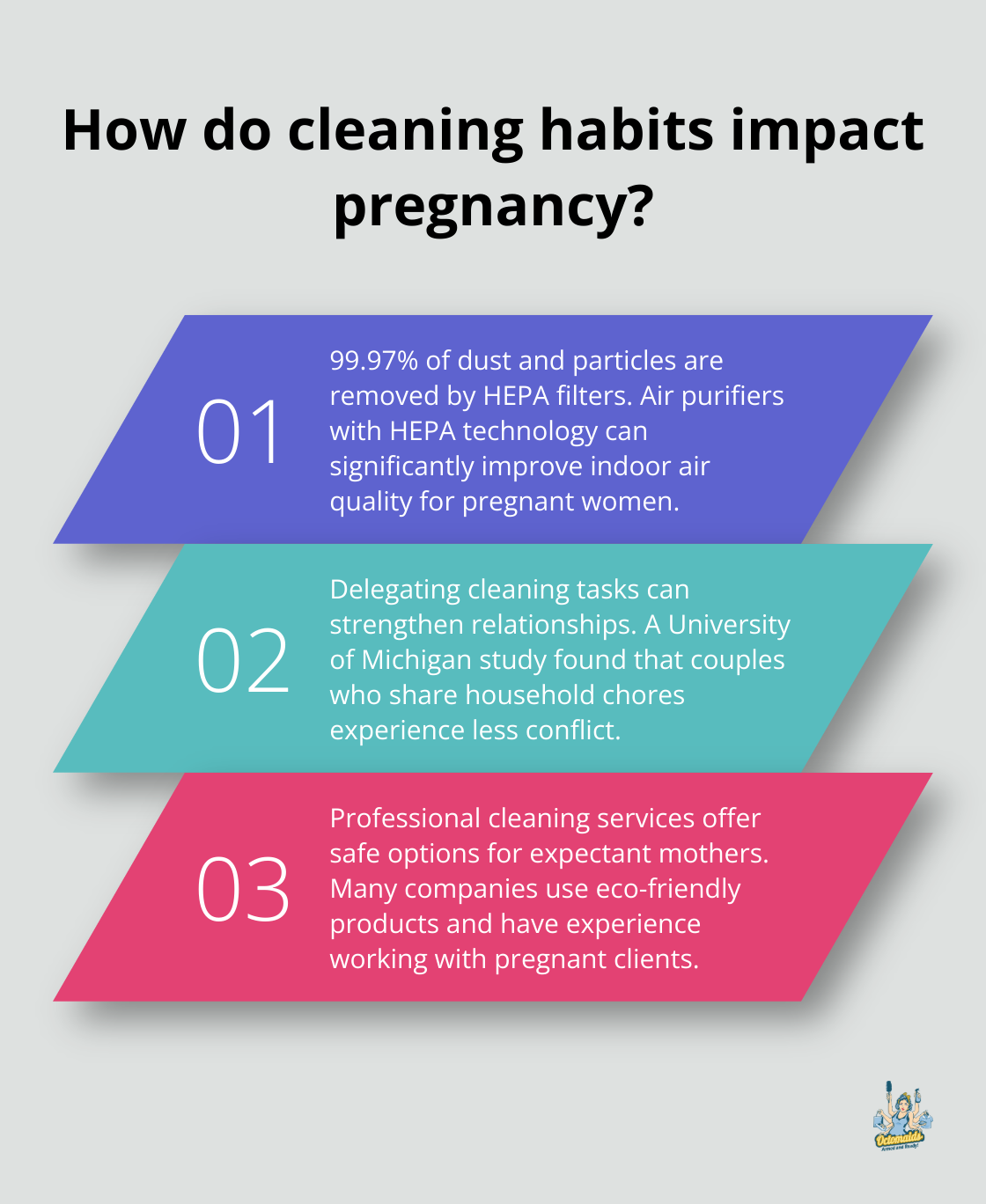
A University of Michigan study found that couples who share household chores have stronger relationships and experience less conflict. Assign tasks based on individual strengths and preferences. For example, your partner might vacuum and mop, while older children can dust or tidy up their rooms.
Hire Professional Cleaning Services
Professional cleaning services offer an excellent option for expectant mothers who want a spotless home without physical strain. However, it’s important to note that most cleaning products are safe to use during pregnancy, including bleach. This means that pregnant women can safely perform many cleaning tasks themselves if they choose to do so.
When selecting a cleaning service, choose companies that use eco-friendly products and have experience working with pregnant clients. Many cleaning services (including Octomaids) offer tailored cleaning solutions with a focus on safe, non-toxic cleaning agents, making them ideal for expectant mothers.
Use Automated Cleaning Tools
Automated cleaning tools can reduce the physical effort required to maintain a clean home. Robotic vacuum cleaners handle daily floor cleaning with minimal supervision. Users can schedule these devices to clean at specific times, ensuring tidy floors without effort.
Smart mops can tackle hard floor cleaning automatically. These devices use either disposable or washable microfiber pads, which reduces the need for harsh cleaning chemicals.
Air purifiers with HEPA filters can improve air quality. The Environmental Protection Agency states that HEPA filters remove at least 99.97% of dust, pollen, mold, bacteria, and airborne particles (size: 0.3 microns).
These alternatives allow expectant mothers to maintain a clean and healthy home environment without compromising their well-being or that of their unborn child.
Safe Cleaning During Pregnancy: Final Tips for Expectant Mothers
Pregnant women can clean their homes safely if they take necessary precautions. They should use natural cleaning products, employ proper body mechanics, and avoid overexertion. Those who ask “Can I do house cleaning while pregnant?” should know it’s possible, but they must prioritize their health and the baby’s well-being over household chores.
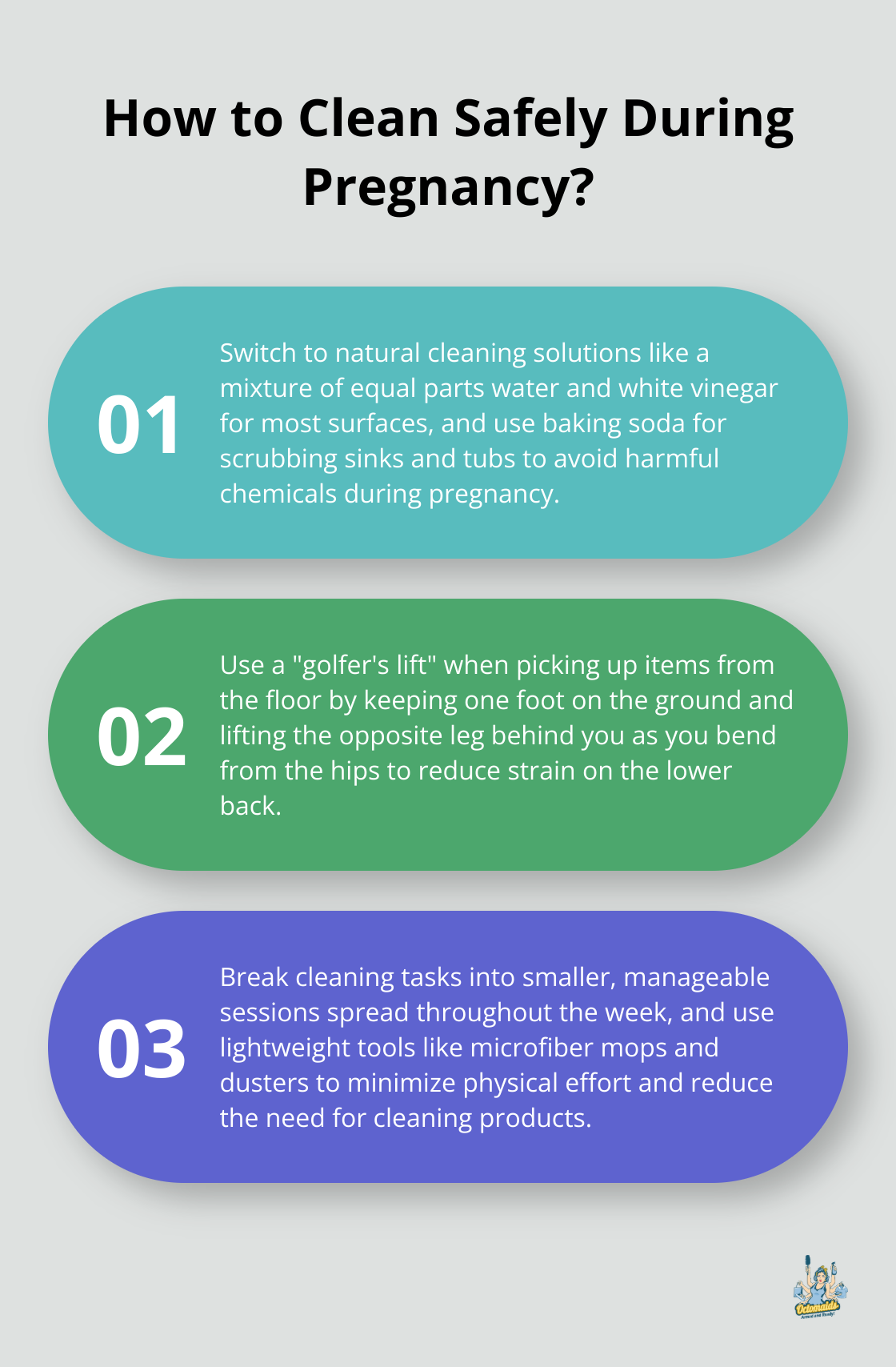
Alternatives exist for expectant mothers who prefer to avoid cleaning. They can delegate tasks to family members, use automated cleaning tools, or hire professional services. These options ensure a clean home without compromising maternal health.
Octomaids offers professional cleaning services tailored for expectant mothers. We use eco-friendly products and experienced staff to provide a safe, clean environment. Pregnancy requires extra care, so make informed decisions about cleaning practices and seek help when needed (your health comes first).
